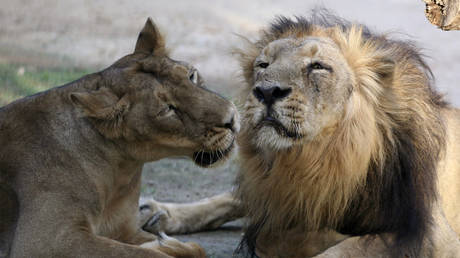
At least eight Asiatic lions have tested positive for coronavirus at a zoo in India’s Hyderabad, local media reported. The big cats have displayed mild Covid-19 symptoms, including dry cough and running noses.
The lions started displaying symptoms on April 24, an unnamed official of the city’s Nehru Zoological Park zoo told The Hindu on Tuesday.
“Yes, the lions were tested after displaying mild symptoms. As of now they are active and are doing well,” the official said, adding that the disease affected four male and four female lions kept in the safari area of the park.
The lions experienced dry cough, nasal discharge and felt generally unwell, losing their appetite. The PCR tests of the lions taken by the zoo veterinary team have returned positive for Covid-19, with the additional samples reportedly collected for India’s Centre for Cellular and Molecular Biology (CCMB) still being analyzed.
The lions are believed to have contracted the virus from their human handlers. Neither CCMB nor the zoo, however, have produced any statements on the outbreak, which has not been officially denied or confirmed.
The zoo outbreak comes amid the ongoing coronavirus surge in India. On Tuesday, the country shot past the 20 million-case mark, with the death toll from the pandemic approaching 222,408. The massive second wave of Covid-19 has put a heavy strain on the country’s healthcare system, with multiple hospitals running out of medical oxygen to treat patients in a critical condition, as well as struggling to accommodate the influx of patients.
If confirmed, the Hyderabad zoo outbreak will become the first documented case of Covid-19 transmission from human to big cat in India. Earlier this year, such transmissions were reported in Sweden, as well as in Pakistan. The outbreaks led to the demise of several big cats, including two rare white tiger cubs. Their lesser feline counterparts, the domestic cats, have been reported catching coronavirus from their humans in several countries as well.
The mechanism of human-to-animal transmission – and back – still provides a lot of room for studying. The Danish mink disaster remains the best-documented case of such transmissions. Farm animals in the country have contracted Covid-19 from humans, developed their own strain and then passed it back, which prompted the government to cull Denmark’s entire mink population, with 15 to 17 million animals exterminated.
Think your friends would be interested? Share this story!




